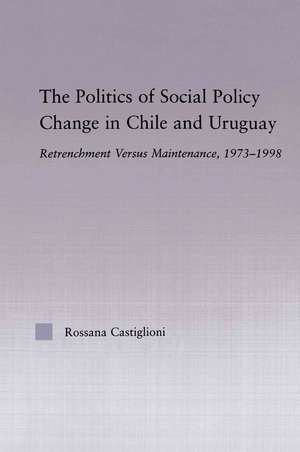The Politics of Social Policy Change in Chile and Uruguay: Retrenchment versus Maintenance, 1973-1998: Latin American Studies
Autor Rossana Castiglioni Nunezen Limba Engleză Paperback – mai 2013
| Toate formatele și edițiile | Preț | Express |
|---|---|---|
| Paperback (1) | 406.81 lei 6-8 săpt. | |
| Taylor & Francis – mai 2013 | 406.81 lei 6-8 săpt. | |
| Hardback (1) | 1000.87 lei 6-8 săpt. | |
| Taylor & Francis – 4 ian 2005 | 1000.87 lei 6-8 săpt. |
Din seria Latin American Studies
-
 Preț: 173.54 lei
Preț: 173.54 lei -
 Preț: 385.44 lei
Preț: 385.44 lei -
 Preț: 390.12 lei
Preț: 390.12 lei -
 Preț: 328.74 lei
Preț: 328.74 lei -
 Preț: 436.14 lei
Preț: 436.14 lei -
 Preț: 393.93 lei
Preț: 393.93 lei -
 Preț: 440.77 lei
Preț: 440.77 lei -
 Preț: 352.93 lei
Preț: 352.93 lei -
 Preț: 362.05 lei
Preț: 362.05 lei -
 Preț: 449.41 lei
Preț: 449.41 lei -
 Preț: 389.70 lei
Preț: 389.70 lei -
 Preț: 510.78 lei
Preț: 510.78 lei -
 Preț: 435.39 lei
Preț: 435.39 lei -
 Preț: 485.24 lei
Preț: 485.24 lei -
 Preț: 212.82 lei
Preț: 212.82 lei -
 Preț: 481.79 lei
Preț: 481.79 lei - 43%
 Preț: 179.10 lei
Preț: 179.10 lei -
 Preț: 426.55 lei
Preț: 426.55 lei -
 Preț: 190.51 lei
Preț: 190.51 lei -
 Preț: 442.50 lei
Preț: 442.50 lei -
 Preț: 412.95 lei
Preț: 412.95 lei - 32%
 Preț: 114.06 lei
Preț: 114.06 lei -
 Preț: 322.27 lei
Preț: 322.27 lei -
 Preț: 389.27 lei
Preț: 389.27 lei - 18%
 Preț: 998.71 lei
Preț: 998.71 lei - 12%
 Preț: 325.34 lei
Preț: 325.34 lei -
 Preț: 436.02 lei
Preț: 436.02 lei - 25%
 Preț: 769.55 lei
Preț: 769.55 lei
Preț: 406.81 lei
Nou
Puncte Express: 610
Preț estimativ în valută:
77.84€ • 81.27$ • 64.42£
77.84€ • 81.27$ • 64.42£
Carte tipărită la comandă
Livrare economică 05-19 aprilie
Preluare comenzi: 021 569.72.76
Specificații
ISBN-13: 9780415653916
ISBN-10: 0415653916
Pagini: 168
Ilustrații: 18 b/w images
Dimensiuni: 152 x 229 x 9 mm
Greutate: 0.23 kg
Ediția:New.
Editura: Taylor & Francis
Colecția Routledge
Seria Latin American Studies
Locul publicării:Oxford, United Kingdom
ISBN-10: 0415653916
Pagini: 168
Ilustrații: 18 b/w images
Dimensiuni: 152 x 229 x 9 mm
Greutate: 0.23 kg
Ediția:New.
Editura: Taylor & Francis
Colecția Routledge
Seria Latin American Studies
Locul publicării:Oxford, United Kingdom
Cuprins
Chapter 1. Introduction. Research Problem, Theory and Methods 1.1 Research Problem 1.2 Relevance of the Cases and Topic 1.3 Leading Comparative Theories on the Welfare State 1.4 Hypotheses and Theoretical Model 1.5 Methodology 1.6 Organization of this Dissertation Chapter 2. The Politics of Retrenchment: The Quandaries of Social Protection Under Military Rule in Chile, 1973-1990 2.1 Introduction 2.2 Soical Policy Retrenchment under Military Rule 2.3 Concentrating Power and Displacing Veto Players 2.4 Ideology of the Policy-Makers: National Security, Gremialismo, and Monetarism 2.5 Final Remarks Chapter 3. The Uruguayan Social Policy Continuity Under Military Rule, 1973-1985 3.1 Introduction 3.2 Social Policy Change During Military Rule 3.3 Dispersion of Power and the Absence of Veto Players 3.4 Ideological Positions of Policy-Makers: The Preminence of Statism 3.5 Final Remarks Chapter 4. Contrasting Social Policy Outcomes: The Case of Uruguay, 1985-1998 4.1 Introduction 4.2 Social Policy Change and Continuity since Re-Democratization 4.3 Dispersion of Power and Multiple Veto Players 4.4 Ideology and Social Policy Change 4.5 Final Remarks Chapter 5. The Unchallenged System: Social Policy Continuity in Democratic Chile, 1990-1998 5.1 Introduction 5.2 Social Policy after the Re-Installation of Democracy 5.3 Dispersion of Power and the Weakness of Veto Players 5.4 Ideological Positions of Policy-Makers: the Continuity of Market-Oriented Ideas 5.5 Final Remarks Chapter 6. Conclusions 6.1 Main Findings and Contributions 6.2 The Road Ahead: Alternative Explanations and Avenues for New Research 6.3 Final Remarks References

























